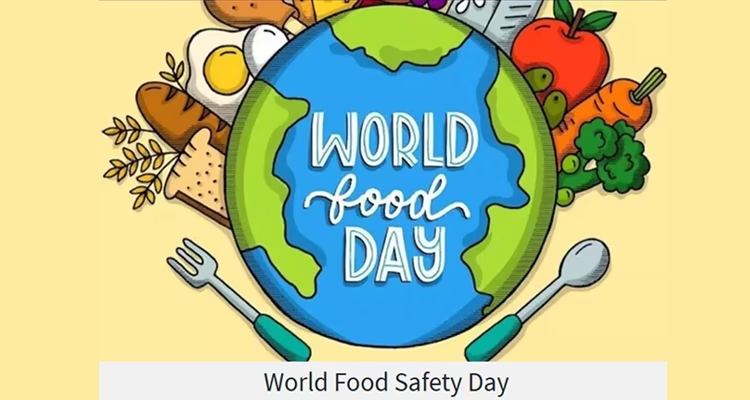
 We celebrated 7th June as World Food Safety Day. Through this day, the World Health Organization (WHO) works to mainstream food safety on the public agenda and reduce the global burden of foodborne diseases. Food is essential to everyone on the planet, which is why food security is always a crucial issue. It is closely related to household resources, disposable income, and socioeconomic status.
We celebrated 7th June as World Food Safety Day. Through this day, the World Health Organization (WHO) works to mainstream food safety on the public agenda and reduce the global burden of foodborne diseases. Food is essential to everyone on the planet, which is why food security is always a crucial issue. It is closely related to household resources, disposable income, and socioeconomic status.
Food safety refers to the safety and sanitation of food to prevent foodborne illnesses—illnesses caused by eating food contaminated with germs, bacteria, or viruses. Food safety is very important because people worldwide fall ill from consuming unsafe food. Although there is enough food produced globally for everyone, rapid changes in the world have caused food availability to decline in some areas, making food security harder to achieve.
Food security ensures that everyone has enough to eat and that families can build their communities without worrying about securing their livelihoods. India ranks 74th out of 113 countries on the Food Security Index. While India meets 100% of the nutritional energy requirement, it falls far behind in quality protein intake, which is only 20% of the recommended level. This gap needs to be addressed by making protein-rich food products more affordable.
Concerns about food security in India date back to the Bengal Famine of 1943, during British colonial rule, which caused the deaths of approximately 2 to 3 million people due to starvation. Currently, India has the largest number of undernourished people in the world—around 195 million.
World Food Safety Day aims to draw attention to, and inspire action for, the prevention, detection, and management of foodborne risks. These efforts contribute not only to food security but also to human health, economic prosperity, agriculture, market access, tourism, and sustainable development.
Access to sufficient amounts of safe food is key to sustaining life and promoting good health. The five main pillars of food security are:
-
Accessibility: Is food accessible to people when they need it?
-
Stability: Are there stable food sources to ensure future food security?
-
Acceptability: Is the food culturally acceptable and suitable for different diets?
-
Availability: Is food readily available when required?
-
Adequacy: Is food safe, nutritious, and produced in environmentally sustainable ways?
Foodborne illnesses are usually infectious or toxic and often invisible to the naked eye. They are caused by bacteria, viruses, parasites, or chemical substances entering the body through contaminated food or water. It is estimated that 420,000 people worldwide die each year from consuming contaminated food. Children under five carry 40% of the foodborne disease burden, with about 125,000 deaths annually.
Food safety plays a critical role in ensuring that food remains safe at every stage of the food chain—from production and harvest to processing, storage, distribution, preparation, and consumption.
Population growth will impact some countries’ ability to produce enough food, especially poor developing countries. Therefore, improving nutrition is essential to boosting income generation, reducing poverty, and providing quality food.
The right to food is a well-established principle under international human rights law. It includes the obligation of states to respect, protect, and fulfill their citizens’ right to food security. To ensure sustainable food security, policies must address issues such as inequality, food diversity, indigenous rights, and environmental justice.
(Written by Vinod Chandrashekhar Dixit)




